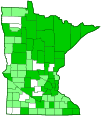Bottlebrush Frost Lichen
(Physconia detersa)
Conservation • Description • Ecology • Distribution • Taxonomy
|
|
||||||||||||||
Description |
Physconia detersa is one of two similar lichens that share the common name Bottlebrush Frost Lichen. The other is Physconia leucoleiptes. Both species are common in Minnesota, are similar in appearance, and grow on both bark and rock. They are best distinguished by the shape of the marginal soralia and by chemical spot tests. Some sources do not separate the two species. Bottlebrush Frost Lichen (Physconia detersa) is a very common, very widespread, medium-sized lichen. It occurs throughout the Northern Hemisphere including Europe, Asia, Greenland, and North America. It occurs throughout the United States except in the deep south. It is very common in Minnesota. It grows on tree bark, on rock, and on moss over rock. The vegetative body (thallus) is leaf-like (foliose), divided into radiating lobes (a rosette), and usually up to 2¾″ (7 cm) in diameter, rarely up to 3½″ (9 cm) in diameter. It is held to the substrate by black, branched, root-like structures (rhizines). The lobes are long with straight sides (linear), usually rounded at the tip, sometimes irregular. They can be 1 ⁄32″ to ⅛″ (1 to 3 mm) wide, but they are usually no more than 1 ⁄16″ wide. The upper surface is shiny and gray to brownish-gray when dry, greenish brown when moist. Cortex-free areas of the thallus (soralia), mostly on the margins, produce reproductive growths (soredia). Soralia sometimes develop on other parts of the thallus, appearing as fissures on the surface. The soralia usually merge together, becoming continuous. The soredia may be finely granular, or it may be in clusters with an outer protective layer. Usually the lobe ends, and occasionally almost the entire thallus, are covered with pale, powdery, flour-like soredia, giving them a frost-like appearance. This is the feature that gives the genus its common name “frost lichens.” The underside of the thallus is dark brown to black near the center and dark tannish brown toward the lobe ends, almost never white. Bottlebrush Frost Lichen infrequently produces disk-like spore producing structures (apothecia). When present, they are 1 ⁄32″ to ⅛″ (1 to 3 mm) in diameter. |
Similar Species |
Ecology |
Substrate |
Trees, rock |
Growth Form |
Foliose |
Habitat |
|
Hosts |
|
Distribution |
||
|
Sources The map at left shows the counties with records or observations of Physconia detersa in dark green. These counties may also have records or observations of Physconia leucoleiptes. The counties in light green have records or observations of Physconia leucoleiptes but not of Physconia detersa. |
|
| 1/30/2025 | ||
Occurrence |
||
Widespread and very common |
||
Taxonomy |
|
Kingdom |
Fungi (Fungi) |
Subkingdom |
Dikarya |
Phylum |
Ascomycota (Sac Fungi) |
Subphylum |
Pezizomycotina |
Class |
Lecanoromycetes (Common Lichens) |
Subclass |
Lecanoromycetidae (Shield Lichens, Sunburst Lichens, Rosette Lichens, and Allies) |
Order |
Caliciales (button lichens, rosette lichens, and allies) |
Family |
Physciaceae (rosette lichens, frost lichens, and allies) |
Genus |
Physconia (frosted lichens) |
Mycobiont |
Physconia detersa |
Photobiont |
|
The taxonomy of Bottlebrush Frost Lichen is far from resolved. Index Fungorum, LichenPortal, NCBI, NatureServe, and iNaturalist list both Physconia detersa and Physconia leucoleiptes as valid full species. NatureServe and iNaturalist separate them by hyphenating the word Bottle-brush for the latter species. MycoBank lists Physconia detersa as valid and Physconia leucoleiptes as a synonym of Parmelia pulverulenta var. leucoleiptes. ITIS lists Physconia detersa but not Physconia leucoleiptes or Parmelia pulverulenta var. leucoleiptes. Catalog of Life does not list any of these names. |
|
Subordinate Taxa |
|
|
|
Synonyms |
|
Physcia detersa |
|
Common Names |
|
Bottlebrush Frost Lichen Frosted Lichen |
|
Glossary
Foliose
Adjective: Leaf-like growth form; referring to lichens with leaf-like growths divided into lobes.
Noun: The leaf-like, vegetative body of a lichen (thallus) that has thin, flat lobes which are free from the substrate.
Linear
Long, straight, and narrow, with more or less parallel sides, like a blade of grass.
Rhizine
A root-like structure of a lichen that attaches the lower layer to the substrate.
Rosette
A radiating group or cluster of leaves usually on or close to the ground.
Soralium
On lichens, an area on the thallus with no cortex, usually on or near the margin or the tip of a lobe, on which soredia are produced. Plural: soralia.
Soredium
An asexual reproductive structure of a lichen in the form of a tiny dull granule on the thallus surface that can be easily brushed off. It consists of a cluster of algal cells (the photobiont) wrapped in fungal filaments (the mycobiont), but without an outer layer of protective tissue (cortex). Plural: soredia.
Thallus
The vegetative body of a lichen composed of both the alga and the fungus. Plural: thalli.
Visitor Photos |
||
Share your photo of this lichen. |
||
This button not working for you? |
||
Luciearl |
||
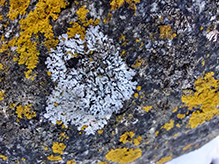 |
||
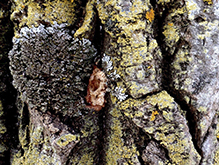 |
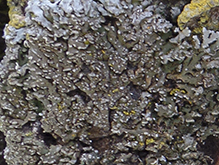 |
|
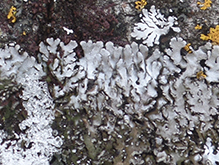 |
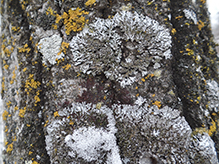 |
|
MinnesotaSeasons.com Photos |
||
|
||
|

Slideshows |
|

Visitor Videos |
||
Share your video of this lichen. |
||
This button not working for you? |
||
|
Other Videos |
||
|

Visitor Sightings |
||
Report a sighting of this lichen. |
||
This button not working for you? |
||
| Luciearl 1/29/2025 |
Location: Cass County lichen on rock |
 |
| Luciearl 1/1/2020 |
Location: Cass County |
 |
| Luciearl 11/29/2019 |
Location: Cass County |
 |
MinnesotaSeasons.com Sightings |
||
|

Created: 12/10/2019 Last Updated: © MinnesotaSeasons.com. All rights reserved. |
